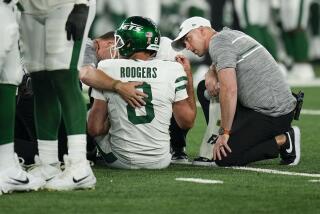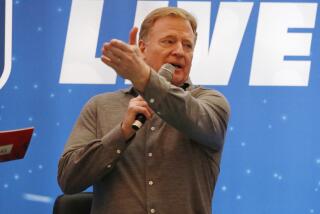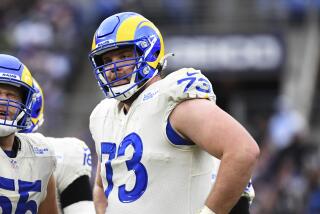Union Disputes Rozelle’s Plan, Files Grievance
- Share via
SAN FRANCISCO — Gene Upshaw, president of the National Football League Players Assn., Tuesday accused NFL Commissioner Pete Rozelle of “making a grandstand play” by mandating random drug tests for players.
The union, meanwhile, filed a grievance to block the plan, which is scheduled to be implemented when the players go to training camp this month.
Upshaw, speaking at a press conference, said the players are “not willing to accept that the drug problem has gotten any worse” and called the grievance the first step in what could be a legal challenge to the program announced Monday by Rozelle.
The commissioner said that while the grievance came as no surprise, he was disappointed in the union’s stance.
“The issue of drug abuse by NFL players has arrived at a stage where everyone is being hurt--players, clubs and the league in general. My preference would have been to implement these improvements to our current drug program with union support,” Rozelle said in a statement issued by the league.
The grievance was sent to the NFL Management Council, which is the bargaining agent for the owners, all 28 clubs and Rozelle. It asked the council to respond within 24 hours, rather than the usual seven days, to the union’s demand that Rozelle’s program be reviewed by an arbitrator.
Jack Donlan, executive director of the council, said he would examine the grievance and respond in seven days.
If the council does not agree to arbitration, the union would go to court seeking a temporary injunction against the plan, union attorney Dick Berthelsen said.
Upshaw said the union is “very concerned” about drug use among players but has an obligation to protect the rights of the players, especially the confidentiality of drug counseling, and uphold the terms of its collective bargaining agreement.
“We plan to take all the steps necessary to protect the rights of the players,” Upshaw said.
The drug-testing plan, which calls for two urine samples from each player at random times during the season, violates the bargaining agreement reached in 1982, Berthelsen said. He said the grievance asks for a quick meeting between the union and management and a continuation of the “status quo” until an arbitrator can be brought in.
Berthelsen said many people are trying to paint the union as protecting players using drugs, but he said, “the bigger issue at stake here is whether we have a collective bargaining agreement.”
Upshaw said the union is not opposed to all anti-drug plans but wants to negotiate a program through collective bargaining.
“I think the NFL and Pete Rozelle are making a grandstand play,” Upshaw said. “Pete Rozelle is saying, ‘I’ll change society.’
“What is his motivation? I think it’s all public pressure,” Upshaw said. “We’re not willing to accept that the drug problem has gotten any worse. We have talked to Rozelle. He said it’s gotten worse. We asked him how. He just said it did.”
Upshaw said he felt remorse about the recent cocaine-related deaths of Cleveland Brown defensive back Don Rogers and Maryland basketball star Len Bias but said drug-testing probably wouldn’t have helped them.
“I attended Don Rogers’ funeral last week and it had an impact on me,” Upshaw said. “But I also feel a responsibility to the players that are still here that I represent. I’m not sure, and everyone would admit, even random testing wouldn’t have helped Don Rogers.
“We cannot legislate morality,” he said. “At some point in time, the player has to take the responsibility to do the things and accept the things that are right. We can’t make him. We can’t follow him 24 hours a day.”
More to Read
Go beyond the scoreboard
Get the latest on L.A.'s teams in the daily Sports Report newsletter.
You may occasionally receive promotional content from the Los Angeles Times.










